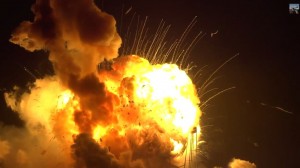The spectacular explosion on the evening of Oct. 28 of an Orbital Sciences Corporation rocket at Wallops Island on the Eastern Shore of Virginia raises safety questions about the rush to commercialize space launches.
The Antares rocket with a Cygnus cargo shipment had been bound for the International Space Station but the rocket burst into flames and exploded six seconds after liftoff. The blast from the sandy barrier island was powerful enough to shatter glass windows at nearby business, according to news reports.
Dulles-based Orbital Sciences is one of several private firms competing for business from the federal government as part of a plan to reduce costs for the Air Force and budget-strapped NASA. Orbital, Blue Origin, SpaceX and United Launch Alliance made up of space veterans Boeing and Lockheed Martin are all vying for contracts by aggressively touting lower prices.
It can get nasty. SpaceX’s iconoclastic leader Elon Musk famously sued the Air Force to break ULA’s monopoly on military satellite launches. He’s also sued to squelch concerns about his rockets’ safety. His firm, as are some others, is pushing manned flights to the space station, space tourism or perhaps missions to Mars or other outer space locations.
Orbital picked up a $1.9 billion contract from NASA in 2008 to deliver cargo to the space station from 2011 to 2015 using its Antares rockets made at a facility in Dulles. Using Wallops Island for its launch site, Orbital successfully launched two demonstration shots in 2013 and two cargo rockets early this year.
According to The Washington Post, the engines used on the Antares rocket were modified, decades-old, Soviet models that the Kremlin stopped using in the early 1970s because they were prone to explode. Orbital picked up some, apparently cheaply, because it was having trouble locating rocket engines from other sources powerful enough to lift its cargoes.
It isn’t known yet what exactly went wrong with the launch this week, but the Russian-made engines are certainly going to be studied. This raises questions about how much cost-cutting and cheap buying the private firms actually do to keep their costs down and maintain their competitiveness.
Musk of SpaceX has criticized using decades-old technology, but he has been accused of pushing cost cuts too hard. He’s been sued by employees who claimed he made them work 60-hour weeks. Obviously, tired workers are prone to make mistakes.
Up until now, politicians and economic development officials in Virginia and Maryland have proudly touted the Mid-Atlantic Regional Spaceport as a sexy, futuristic display of how up with the times they are.
When SpaceX launched a Falcon 9 rocket in May 2012 from Cape Canaveral, then Virginia Transportation Secretary Sean Connaughton told Virginia Business magazine, “Obviously a lot of people focus on SpaceX. But Virginia now is pushing its own plan to grab a share of the commercial space market.” He unwittingly added: “Do you realize that in the fall (of 2012), it’s not going to be SpaceX you’ll be talking about. It’s going to be Orbital.” Missed it by two years. Ouch.
Other officials have tried to make Wallops Island a tourism destination. The Web site of the Norfolk-based Virginia Commercial Space Flight Authority pitches the draw for visitors. “The people on the Eastern Shore are wonderful,” writes Zig Leszczynski, the authority’s deputy executive director. “Chincoteague is a great area, so when folks come out to see the launches, you can also enjoy a kayak trip and some good seafood.”
NASA has had its share of disasters, including the 1986 loss of the Challenger Space Shuttle and then the loss of the Columbia Space Shuttle in 2003, killing a total of 14 astronauts. But as private firms accelerate their space activities, there are concerns that they might not have the rigorous safety testing that government launches have had.
On Aug. 25, a three-engine Falcon 9 rocket launched by SpaceX blew itself up seconds after leaving its Texas launch pad. Other problems have included “several anomalies” that occurred in the company’s civilian space flights” including having not enough fuel during a launch and a fire on an engine structure. The Air Force is investigating.
Private companies are still racking up deals. Blue Origin, a firm started by Jeff Bezos, the Amazon chief and owner of The Washington Post, got a deal last month to help supply rocket engines for ULA, which had been depending solely on Russian-built engines to launch its heavy rockets. Their continued use is in jeopardy because of current political tensions with Russia and Ukraine.
So what used to be an A-OK world of slim, professional astronauts and nerdy guys with pocket holders for their pens has turned into something of a free-for-all. It can be seen from the comfort of your kayak in an Eastern Shore salt marsh.



